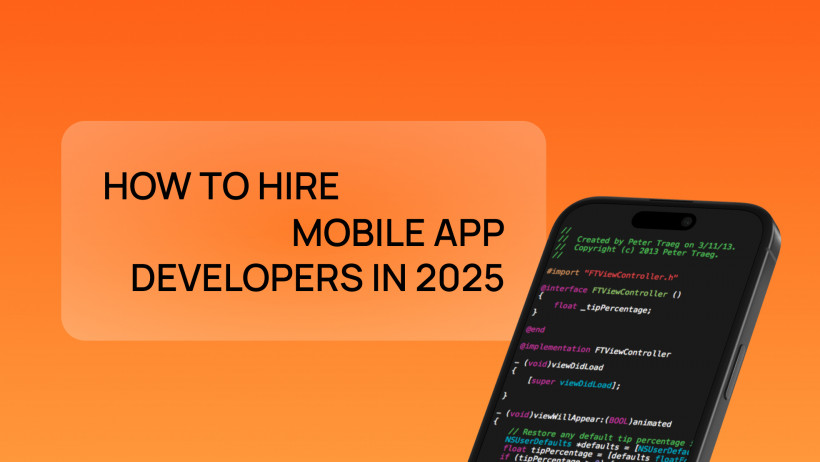Need to hire mobile app developers in 2025? You’re not alone. The demand for mobile solutions is exploding whether it’s next-gen social platforms, AI-driven productivity tools, or niche eCommerce apps, businesses of all sizes are racing to bring their ideas to life. But here’s the hard truth: an app is only as good as the team that builds it.
In 2025, hiring the right people isn’t just about coding knowledge. It’s about finding developers who can translate your business goals into digital reality, who know how to collaborate seamlessly in remote-first environments, and who stay agile as technologies evolve.
The challenge? With so many options (in-house developers, freelancers, or outsourced teams) the process can feel overwhelming. Where do you even start? Which model fits your project best? And how do you avoid costly mistakes while ensuring long-term success?
That’s exactly what this guide is here to solve. Step by step, we’ll walk you through how to hire mobile app developers in 2025: from spotting the right moment to expand your team, to choosing between different hiring models, to setting up collaboration that actually works. By the end, you’ll have a clear, practical, and results-driven roadmap to building an app team that delivers.
When You Need to Hire App Developers

You might already know you need developers, but let’s clarify the situations where hiring is not just helpful but truly essential.
- Starting a new product – you’ve validated an idea, maybe even tested it with early users, but now it’s time to bring it to life. Building an MVP (minimum viable product) requires developers who can move fast without sacrificing quality and then help scale it into a polished, market-ready app.
- Scaling existing development – your in-house team is talented, but deadlines are piling up, and features keep getting delayed. Adding external developers gives you the extra hands and expertise to accelerate delivery without burning out your core staff.
- Lack of in-house expertise – maybe your company excels in backend systems, web platforms, or data science but doesn’t have the right mobile app developer skills. Whether it’s Swift, Kotlin, Flutter, or React Native, specialized knowledge is critical for building a smooth, modern mobile experience.
Other common triggers include the need for rapid prototyping to test a new market, modernizing a legacy mobile app with updated tech stacks, or pivoting your product toward new user demands.
If any of these situations sound familiar, it’s a clear signal that it’s time to find an app development team that matches both your technical needs and your business goals.
In-House vs Outsourced vs Freelance
One of the first big decisions in hiring mobile developers 2025 is the type of team you want to work with. Let’s break it down:
In-House Developers
- Pros: Full control, easy collaboration, deep alignment with company culture.
- Cons: High costs (salaries, benefits, office space), slower hiring.
Outsourced Teams (Agencies or Development Partners)
- Pros: Access to a scalable and secure team extension, quick start, wide range of expertise.
- Cons: Less direct control, requires strong communication setup.
Freelancers
- Pros: Flexible, affordable for short-term projects.
- Cons: Limited availability, possible inconsistency, harder to build long-term ownership.
Best way to hire app developers depends on your priorities: cost, speed, control, and long-term vision.
Where to Find Top Mobile Developers

So, where do you actually look? In 2025, businesses have more options than ever:
- Freelance platforms – Upwork, Toptal, Fiverr. Great for one-off tasks or specialized skills.
- Tech agencies – partner with companies that provide vetted teams and project management.
- Developer marketplaces – platforms like Arc or Gun.io help you hire mobile developers remotely with strong pre-vetting.
- Referrals and networking – don’t underestimate LinkedIn or industry events. The best talent often comes through word of mouth.
| Tip: Instead of relying only on one source, combine them. Start with hiring platforms and agencies for quick access, but validate with referrals. |
Not all developers are created equal. When you set out to find an app development team, you need professionals who combine hard technical expertise with soft skills that make collaboration effective. In 2025, the demand for versatile developers is higher than ever, so knowing what to look for will save you time, money, and frustration down the road.
Key Skills and Technologies to Look For
Must-Have Technical Skills
- Native development (Swift for iOS, Kotlin for Android) – essential for projects where performance and platform-specific features matter most. For example, fintech or healthcare apps often rely on native development for speed and security.
- Cross-platform frameworks (Flutter, React Native) – perfect for businesses that want to launch on iOS and Android simultaneously without doubling the workload. This approach reduces time-to-market and is often the best way of hiring app developers for startups.
- Backend & APIs (REST, GraphQL, cloud integration) – strong backend knowledge ensures your app can scale and connect seamlessly with third-party services, from payment gateways to analytics tools.
- UI/UX awareness – a good developer doesn’t just “make it work.” They ensure the app is intuitive, attractive, and engaging. Users don’t remember the code, they remember the experience.
- Security and scalability – with data privacy regulations and growing user bases, developers must know how to secure sensitive data, use cloud storage effectively, and implement CI/CD pipelines for smooth updates.
Soft Skills
Technical expertise is crucial, but it’s not enough. The way a developer works within a team can make or break your project. Look for:
- Problem-solving mindset – developers who can troubleshoot issues quickly and propose solutions rather than waiting for direction.
- Communication in distributed teams – since many companies hire mobile developers remotely, clear and proactive communication across time zones is a must.
- Flexibility in agile teams for mobile projects – modern development is iterative. You want people comfortable with changing requirements and sprint-based collaboration.
Why Both Matter
Hiring only for technical skills may give you good code, but not a great product. On the other hand, hiring for soft skills without technical depth can lead to delays and costly rewrites. The sweet spot? A balanced team that codes well and collaborates smoothly, aligning technical execution with your business goals.
Vetting and Interviewing Candidates
Now comes the tricky part: making sure your candidates are the right fit. Here’s a simple process:
- Review portfolios – look for apps similar to your goals.
- Technical interview questions – ask about past challenges, scalability issues, and preferred frameworks.
- Coding challenges – small but relevant test tasks show real skills.
- Soft skills evaluation – can they explain technical concepts clearly? Do they communicate proactively?
Remember: hiring isn’t just about technical excellence. It’s about ensuring remote developer collaboration works in practice.
Choosing the Right Engagement Model
Different projects call for different approaches. The three most common are:
- Fixed Price – best for well-defined projects with clear requirements and timelines.
- Time & Materials – flexible model where you pay for hours worked; ideal for evolving projects.
- Dedicated Team – a long-term setup where developers act as part of your company.
Many companies find the dedicated team model the sweet spot, it combines flexibility with loyalty.
Onboarding & Collaboration Tips
Once you hire developers, you need them to work effectively. Here’s how:
- Agile setup – use sprints, daily stand-ups, and regular reviews.
- Tools for communication and tracking – slack, Jira, Trello, Notion, GitHub.
- Time zone coordination – ensure overlaps for real-time discussions.
- Clear ownership and expectations – define roles within the development team structure early on.
- Onboarding and trial periods – give new developers a 1–2 month probation period to confirm fit.
Strong onboarding = faster delivery and fewer headaches.
How WEZOM Builds and Scales Expert App Teams

At WEZOM, we’ve seen firsthand that hiring mobile developers in 2025 is about more than simply filling technical roles. It’s about creating true synergy between your business objectives and the technical execution that brings them to life. That’s why our approach goes beyond coding, we build teams that deliver measurable results.
Here’s how we do it:
- Full-cycle hiring & team formation – from defining the exact mobile app developer skills your project requires to carefully vetting and placing the right professionals, we ensure every developer fits both technically and culturally.
- Business-aligned project management – we don’t just deliver code; we align development with your KPIs, timelines, and growth strategies, keeping your app focused on real business outcomes.
- Scalable and secure team extension – start with a small dedicated unit and expand as your product evolves. Our model ensures flexibility without sacrificing quality or security.
Conclusion
Hiring mobile developers in 2025 doesn’t have to be overwhelming. The process becomes much easier once you understand your options, evaluate skills with a clear framework, and set up collaboration in a way that works for both sides.
When you choose the right team, you unlock real business advantages:
- Fewer mistakes thanks to proven processes and the right expertise,
- Faster delivery through agile methods and seamless coordination,
- A product that truly matches your vision — not just technically, but strategically.
Remember, building a mobile app is not just about writing code. It’s about creating a digital product that engages users, supports your growth, and evolves with your business.
So, whether you’re working on your very first MVP or preparing to scale an existing app to millions of users, the best way to hire app developers is to focus on alignment, skills, and collaboration.

Ready to take the next step? Let’s connect and explore how we can help you find an app development team that fits your business perfectly — today and in the future.

